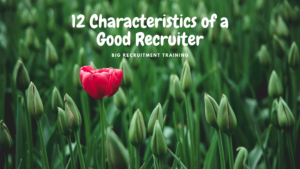Blog
12 Characteristics of a Good Recruiter
- December 28, 2020
- Posted by: Ishani Singh
- Category: Recruitment

As a recruiter, your work involves finding a good fit for a vacancy, while meeting the requirements of both – the client and the candidate and you essentially bridge the gap between the hiring party and the person being hired. To perform this crucial task successfully, that is to say, to be a good and efficient recruiter, you need a few personal traits, apart from the transferable skills that can be learned in the process.
From the client company’s perspective, a recruiter must be good at fact-checking, be honest, and have good judgment in picking candidates. From a candidate’s perspective, a recruiter must be approachable and must have a strong sense of ethics in keeping the candidate’s best interest in mind.
Let’s focus on the personal traits in this blog and we’ll soon post one about the transferable skills of a successful recruiter. The traits mentioned here differentiate a good and successful recruiter from an average one.
1. Leadership Qualities
Displaying strong leadership skills helps you attain entrepreneurship skills and outlook.
Being a good leader undoubtedly helps in leading and managing a team. It allows you to understand the strengths of individual team members and leverage human capital by allocating the profile requirements accordingly.
2. Value System
The value system refers to a person’s standards and self-discipline set, based on moral rules and discipline and the willingness to abide by these rules. It enhances your personal branding in the eyes of the clients and the candidates and increases your level of confidence.
Recruiters with high value are less manipulative and hence are an asset to the organization. They manage to stay firm when dealing with difficult situations or people.
3. Ability to persuade

Ability to persuade means your ability to make the client and candidate look at the situation from a long-term perspective, to see the broader picture. This in no way implies misleading them into thinking that the opportunity offered in anything but what it actually is.
Candidates may turn down an opportunity for them, at first, can not see how it would be beneficial for them. By providing them with the right information and mindset, a recruiter can make them realize how picking up this opportunity can be good for their career.
Similarly, a company may reject a candidate as the company currently does not require the candidate’s skill-set, but the same candidate may become a key player in their future organizational development.
4. Solid follow-up
A simple follow up call to the organization or a mere thank you note can do wonders in differentiating you from the sea of recruiters trying to woo the organization in order to represent it in the job market. Similarly, sending a hello message to the potential candidate you met in a networking event can help them remember you in case they want to switch jobs or know someone one wants to.
The efforts you need to put in following the simple follow up routine is minimal, but the return can be huge.
5. Good judgment
A recruiter must be able to judge if a candidate will be a good match for the company and this can be tricky to point out if the potential candidate just looks good on paper. Recruiters also have to look beyond the salary and benefits offered by the company to know about the culture of the organization to figure out if the candidate would be happy working there in the future.
6. Creativity

Creativity is the use of imagination to create something useful. Nowadays firms are keen to encourage creativity in various fields including recruitment. It can help you in leveraging the available data to its optimum level. It can thus help you be more productive at work.
Creativity is one of the qualities that are very useful in formulating strategies. It can be very helpful while coming up with a strategy for Head Hunting.
7. Integrity
Integrity is the quality of displaying honesty along with having strong moral principles.
It helps you handle any situation with confidence. Recruiters with high integrity are preferred by both clients and candidates.
8. Approachability
A recruiter needs to come out personable and approachable for clients and candidates to feel comfortable. This is a very important personal trait to help build professional relationships with clients as well as candidates.
It is essential for building up trust in the professional relationship between the recruiter and the client/candidate. They are thus more likely to conduct business with you in the future and may even recommend you to others.
9. Managing Self-Motivation

It is important for a recruiter to maintain a positive attitude towards work and self-motivation plays an important role in accomplishing this as well as in increasing the level of confidence.
Managing self-motivation allows you to improve the strategy formulation and planning of tasks to be done.
10. Lifestyle
A good lifestyle is all about a healthy way of living. It plays a vital role in trying to maintain sound health and fitness. Good health is more than about your physical state, and also includes your social and mental well being.
A healthy mind and body will help you stay perfectly balanced for working effectively. A healthy recruiter is more likely to be able to manage stress and work pressure as well as handle difficult situations with colleagues, clients, or candidates.
A fit recruiter will probably have a high level of motivation to achieve his goals. This requires getting regular exercise and eating a balanced diet, to name a few. This will enhance your work effectiveness and efficiency and will help you in developing a personal brand.
11. Passion and Interest level
Having a passion for recruitment is an important and necessary trait for success, and also the reason why good recruiters are excited to get out of bed in the morning.
Being passionate about work is highly beneficial for any professional. It enhances self-motivation and allows one to achieve better results. It helps a recruiter in networking and in building a personal brand.
12. Emotional Intelligence

Emotional Intelligence refers to the ability to identify, manage, and reason with emotions. It is the competency to balance emotions and reason so as to maximize long term happiness.
Emotional Intelligence is a valuable skill, which can be improved with training and practice.
A recruiter needs to cultivate these personal traits not only to build a good rapport with the involved parties but also to perform optimally in any hiring situation.

Ishani works as Manager – Social Media & Strategy Big Ideas HR Consulting Pvt. Ltd. and also as a Freelance Digital Marketer. She has a knack for problem-solving and also enjoys writing. She loves to share her views and knowledge with the readers by the medium of her blogs.
